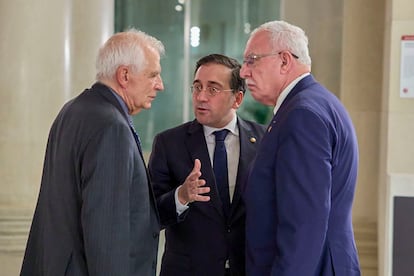European and Arab ministers meet in Barcelona to discuss the future of Gaza and Palestine
Saudi Prince Faisal bin Farhan will present the positions of Islamic countries in the absence of Israel, which has declined to attend the summit

The foreign ministers of the European Union will meet with representatives of Arab countries in Barcelona on Monday to discuss how to bring an end to the humanitarian catastrophe being caused by the war between Israel and Hamas, and to draw up a road map for the future of the Gaza strip and Palestine when the guns fall silent. The forum of the Union for the Mediterranean (UfM), an organization dedicated to fostering cooperation between EU countries and those on the southern shores of the Mediterranean and whose discussions are usually of a technical nature, will this time be a space for high-level political dialogue on a war that threatens to spread throughout the region and is already widening the gulf between the West and Muslim countries.
The guest of honor at the meeting is the Saudi Arabian Minister of Foreign Affairs, Prince Faisal bin Farhan, who is not a member of the UfM but will lay out the conclusions of the summit held between Arab and Islamic countries on November 11 in Riyadh and who will speak on behalf of the Arab-Islamic ministerial committee. The Riyadh meeting was attended, among many others, by Iranian President Ebrahim Raisi, who visited the Saudi kingdom for the first time after the recent reconciliation between the two countries, which was mediated by China.
The Barcelona meeting, which brings together 43 countries, is expected to break the record for participation in this type of forum, with 27 delegations represented at ministerial level. Among the European ministers who have confirmed their attendance are those of France, Germany, Italy, Belgium, Ireland, and Portugal, while representing the Arab nations will be the heads of diplomacy of Jordan — which co-chairs the UfM — Egypt, Turkey, Tunisia, Lebanon, and Morocco, as well as the Palestinian National Authority (PNA).
The most notable absentee will be Israel, which announced last Thursday that it would leave its seat empty claiming that the agenda of the meeting had been altered, without consultation, to focus on the Gaza war, posing the risk that it would become a trap against the government of Benjamin Netanyahu.
Israel’s absence does not mean that there will not be serious debate. European sources acknowledge that it is difficult for some Arab countries to recognize Israel’s right to defend itself after the terrorist attack launched by Hamas on October 7. On the European side, some partners, such as Germany, are reluctant to ask the Israeli government for a ceasefire and limit themselves to calling for “pauses” to allow humanitarian aid to enter the Strip, although an appeal could be tabled to extend the current four-day truce.
Mutual recognition of two states
Instead, consensus is likely to be reached on the need for an international conference to address the resolution of the Middle East conflict based on mutual recognition of two states — one Jewish and the other Palestinian — living in peace and security. Israel rejects this initiative, which was promoted by Spain and has already been taken up by the EU, the Arab League, and the Organisation of Islamic Cooperation, whose representatives will also be in Barcelona.
According to EU sources, The bloc’s High Representative for Foreign and Security Policy, Josep Borrell, will put forward the need to prepare for the post-conflict situation in Gaza, not only due to the destruction of essential infrastructure but also because of Israel’s stated objective of dismantling Hamas, which in addition to being an armed militia managed the administration of the daily life of more than two million Gazans in the Strip before the war. It will not only be a question of implementing a multi-million-dollar investment plan but of taking over the administration of the Strip, a role that Brussels believes the United Nations could perform, at least until the Palestinian Authority is in a position to do so.
At a dinner on Sunday evening attended by the heads of the delegations invited to the forum, Spanish Minister of Foreign Affairs José Manuel Albares reiterated his condemnation of the “indiscriminate killing of civilians” carried out by Hamas on October 7 and demanded the “immediate and unconditional release of all the hostages” being held by militias in Gaza. “Spain has been very clear since the beginning of the crisis in calling for an immediate ceasefire and demanding that Israel scrupulously respect international humanitarian law,” said Albares, who also rejected Israel’s accusation that Madrid has aligned itself with Hamas, which the Islamist militia itself has fueled by applauding the position maintained by Spanish Prime Minister Pedro Sánchez and his Belgian counterpart, Alexander De Croo, during their recent tour of the region.
Sign up for our weekly newsletter to get more English-language news coverage from EL PAÍS USA Edition
Tu suscripción se está usando en otro dispositivo
¿Quieres añadir otro usuario a tu suscripción?
Si continúas leyendo en este dispositivo, no se podrá leer en el otro.
FlechaTu suscripción se está usando en otro dispositivo y solo puedes acceder a EL PAÍS desde un dispositivo a la vez.
Si quieres compartir tu cuenta, cambia tu suscripción a la modalidad Premium, así podrás añadir otro usuario. Cada uno accederá con su propia cuenta de email, lo que os permitirá personalizar vuestra experiencia en EL PAÍS.
¿Tienes una suscripción de empresa? Accede aquí para contratar más cuentas.
En el caso de no saber quién está usando tu cuenta, te recomendamos cambiar tu contraseña aquí.
Si decides continuar compartiendo tu cuenta, este mensaje se mostrará en tu dispositivo y en el de la otra persona que está usando tu cuenta de forma indefinida, afectando a tu experiencia de lectura. Puedes consultar aquí los términos y condiciones de la suscripción digital.








































